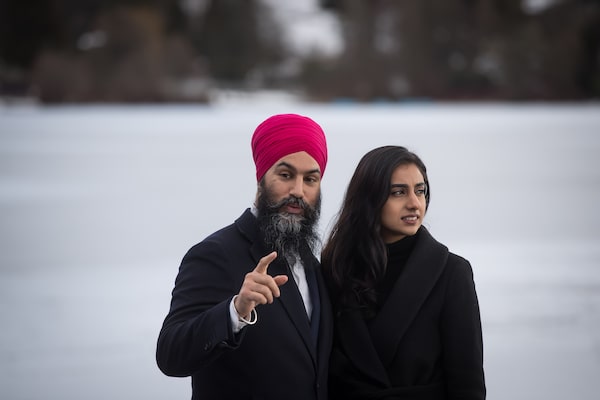
NDP Leader Jagmeet Singh smiles after casting his ballot for the federal by-election in Burnaby South at an advance poll on Feb. 15, 2019.DARRYL DYCK/The Canadian Press
Jagmeet Singh faces the biggest test of his NDP leadership in a by-election on Monday as he vies for a seat in the House of Commons.
The Burnaby South vote in the Vancouver region is one of three by-elections taking place on Monday, with others north of Toronto and in Montreal. The votes come just six months before campaigning is likely to officially begin for the general federal election.
Much is at stake for Mr. Singh, who was elected leader of the NDP in the fall of 2017 on a decisive first-ballot victory. Previous NDP leader Tom Mulcair said in January that it would be difficult for Mr. Singh to stay on as leader if he loses Burnaby South. Mr. Singh at the time insisted he would lead the NDP this fall regardless of the by-election result. The 40-year-old has struggled at times as party leader: He has been criticized for low poll numbers and poor fundraising.
Brad Lavigne, who helped orchestrate Jack Layton’s orange wave in 2011 as NDP campaign chief, said on Sunday that a victory in the by-election would be essential to unite the NDP.
Mr. Lavigne said Mr. Singh has poured considerable personal energy into the riding, through extensive door-knocking and meetings with constituents. The riding has voted NDP in the past on a federal and provincial level. The B.C. NDP dominated Burnaby when John Horgan was elected in 2017, and on Saturday the Premier on Twitter called on voters to get to the polls to back Mr. Singh.
The Burnaby South contest has been turbulent. The Liberals’ first candidate, Karen Wang, stepped down after a social media post on the social messaging app WeChat that zeroed in on Mr. Singh’s ethnicity and highlighted that she was only candidate of Chinese ethnicity. A recent all-candidates’ debate became heated on issues of race and immigration.

Mr. Singh, centre, campaigns for the by-election in the food court at an Asian mall in Burnaby, B.C., on Feb. 24, 2019.DARRYL DYCK/The Canadian Press
Richard T. Lee is the new Liberal candidate. Jay Shin is running for the Conservatives. Laura-Lynn Tyler Thompson represents the upstart People’s Party of Canada. The Greens chose not to run a candidate against Mr. Singh.
Meanwhile, Prime Minister Justin Trudeau faced criticism last fall for delaying a by-election call after the NDP’s Kennedy Stewart vacated the Burnaby South seat in September to become the mayor of Vancouver.
Mr. Singh said voters are “very disappointed” in Mr. Trudeau’s Liberal government.
“It looks more and more like this government and Mr. Trudeau and the Liberal party are working in the interest of a massive multinational corporation,” said Mr. Singh, referring to the SNC-Lavalin affair.
Political scientist Richard Johnston at the University of British Columbia said the SNC-Lavalin case could be a “gift” for Mr. Singh, because it could turn some potential Liberal voters to the NDP.
David Moscrop, a political scientist at the University of Ottawa, said it is unclear whether Mr. Singh should stay on as leader of the NDP if he lost.
“There’s this assumption that if he lost the by-election, he couldn’t show his face in the general election. I don’t think Canadians would really care,” Mr. Moscrop said. “The NDP caucus might see things differently.”
In 2015, the NDP barely won Burnaby South, as the Liberals had a strong showing in the province when Mr. Trudeau swept to power. Mr. Stewart, who had won a close race in Burnaby-Douglas in 2011, won 35.1 per cent of the vote in Burnaby South, ahead of the Liberals’ 33.9 per cent. The margin was 547 votes. The Conservatives had 27.1 per cent of the vote.
The Burnaby-South riding is an amalgam of two older ridings, the southern half of Burnaby-Douglas – where the NDP had a long, but narrow, hold on power federally – and the western half of Burnaby-New Westminster – where the NDP had a long, and mostly dominant, hold on power federally.

Mr. Singh gestures while campaigning for the by-election with his wife Gurkiran Kaur Sidhu, in Burnaby, B.C., on Feb. 24, 2019.DARRYL DYCK/The Canadian Press
With files from Canadian Press